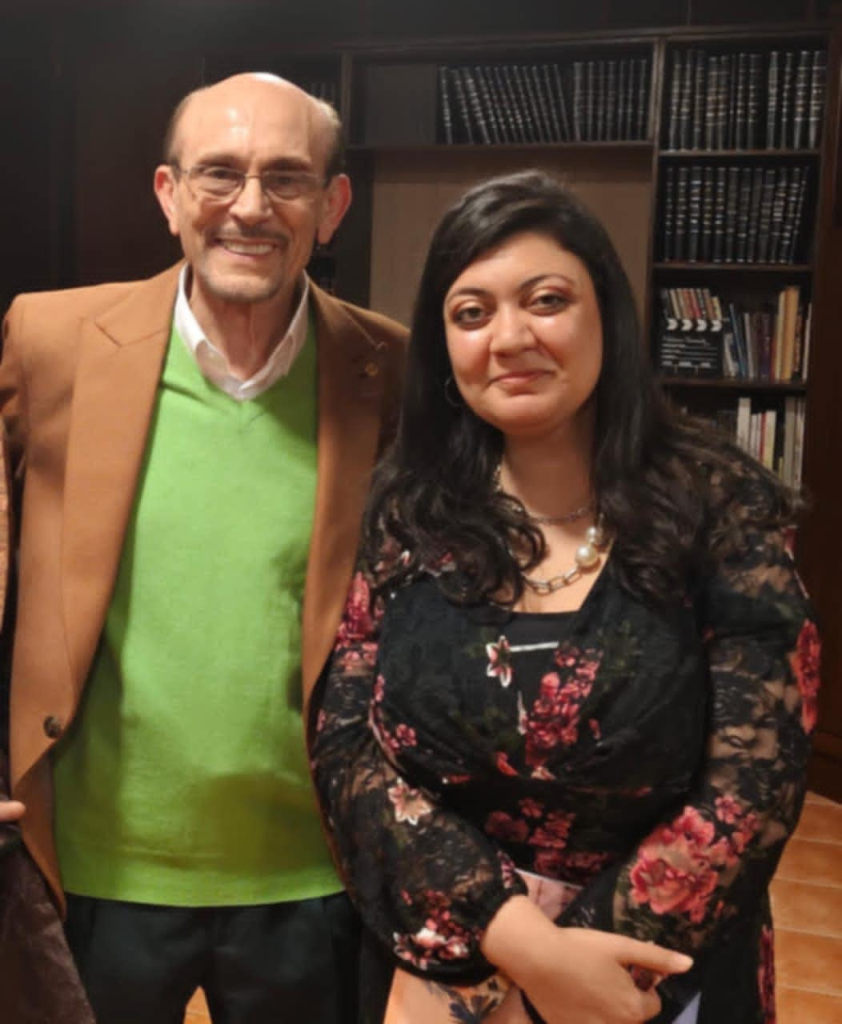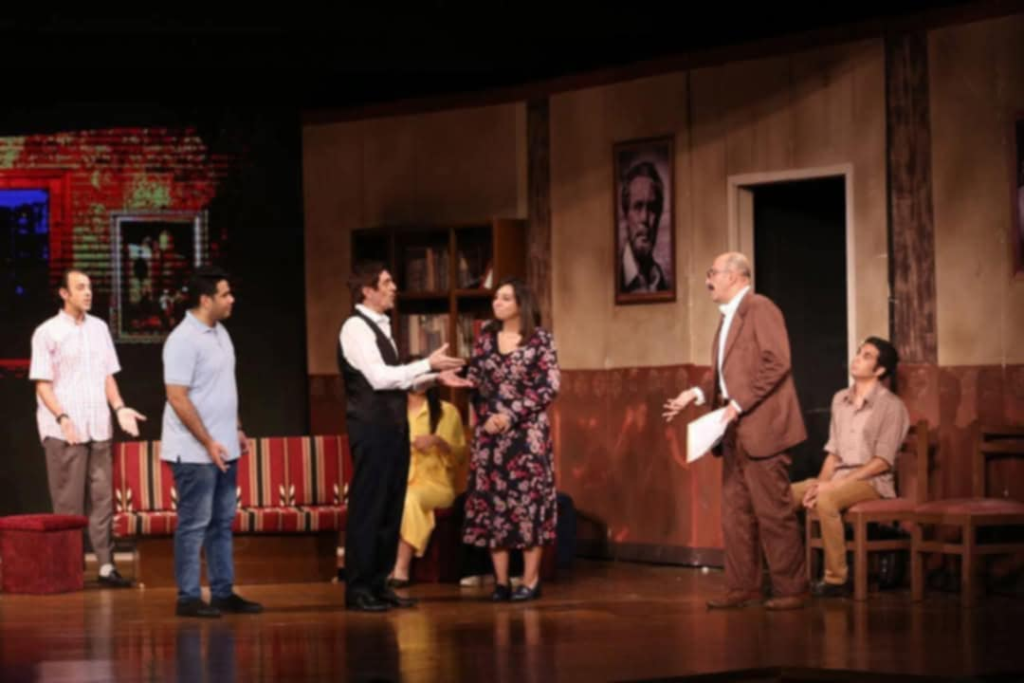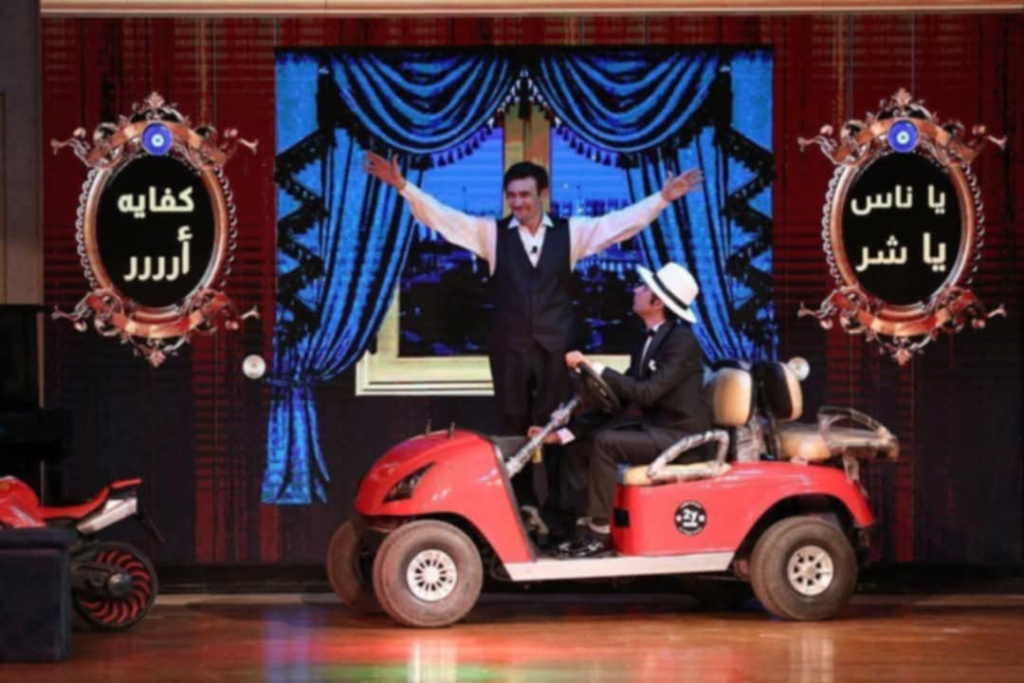
Fadwa Attia from Egypt writes about play (Fares reveals the hidden) Mohamed Sobhi’s directorial vision, from the very first scene, is presented by Sobhi using the technique of merging the cinema screen with theatrical performance, using footage from the character of Faris Faris Balajwad in the series, which he played years ago, to confirm a specific identity at the beginning of the play.
He takes us back to the very first scene of that, enthusiastically entering the scenes of that train—the train that expresses the history and identity of a nation, and the Al-Sadawi family, who came from different places for the inheritance and do not know each other—and a discussion about the treasure in the scene that follows, in an enjoyable transition between Cairo Station and the scene of the apartment in which they will live, which is the family home, conveying to us the concerns of the Egyptian household, from free education and its concerns to Afrocentricity, which is trying to steal the identity of the ancient Egyptians, to the conscientious censorship of our lives, to artificial crying, globalization, technology, and the mobile phone that has torn the Egyptian family apart.

All of this is done in successive scenes in the first act as they search for the treasure amidst a succession of slogans, songs, lighting, and sets, and an attempt to decipher the treasure between the two heroes of the play, Mohamed Sobhi and Wafaa Sadek. By inviting the 22 heirs of Hafez Naguib to search for the treasure of their great patriotic grandfather, the land usurped by Maysoun, Mudalla Ghazi. These heirs include traitors, agents, pessimists, frustrated opportunists, superficial and greedy individuals. They resorted to deception until they were burdened with debts in their quest to fulfill the terms of the requirements of the rulers of Zion to the letter, ending with their dispersal, despairing and hopeless, due to their lack of true awareness of what was being plotted against them.
A play by the Fares Studio troupe, Uncovering the Hidden. This is the Actor’s Studio band, founded by the star Mohamed Sobhi in the eighties. With the team spirit, expressing the dreams of young people today, raising the slogan of awareness of the Palestinian cause. These are the names of the actors and actresses.

This play revolves around the events of a knight’s play, which reveals the hidden, set against a melodramatic background. A true artistic, comedic, musical, and theatrical show, presented by the Actor’s Studio troupe, written and directed by Mohamed Sobhy, with Ayman Fatia participating in the book, decor by Mohamed El-Gharbawy, lyrics by Abdullah Hassan, music by Sherif Hamdan, and starring: Mohamed Sobhy (Fares), Wafa Sadek (Baheya), Kamal Attia (Dahab), Rehab Hussein (Maison), Angelica Ayman (Nidal), Laila Fawzy (Souad), Dalida (Shaimaa), Mustafa Youssef (Ghazy), Mohamed Shawky (Shawky), Lamia Orabi (Abla), Dalia Nabil (Malak), Michael William (Michael William, Daqdaq), Abou Heiba (Sand), Helmy Galal (Aref the lawyer), Mohamed Abdel Moaty (Mukhtar), Alaa Fouad (Kamal), Khaled Mohamed (the final man), Gamal Abdel Nasser(Sadon), Walid Hany, James: Mahmoud El-Sherif (Rahma), Remasib (Sara), Lamar Awad (Hanin), Bilal Mohamed (Seif).
The play consists of two acts, each with seven scenes, and achieves harmony in all elements between the various sets and theatrical scenery, from the station to the apartment to the palace to the grounds. The smooth and effortless performance, the spirit of a loving team, the various topics including the identity of the homeland, the Palestinian cause, the golden billion, education issues, and others, and the emphasis on “We are all one, Muslim and Christian, hand in hand.”

The music, theatrical lighting, and the integrated visual image with integrated scenography, in addition to the appropriate clothing for each actor and actress, the songs and performance in singing as well, with a new return to emphasize identity, homeland, and belonging, and a reminder of the integration of cinematic presentation with theater, by integrating the character of Fares, who appeared to us years ago in the series “Fares without a Horse,” so that the prologue at the beginning of the play became the first scene that attracted the audience. As for the children, he presented them in the impact of technology and artificial intelligence on their lives, bringing us to our lives and what is in them, so that we can stand with ourselves, fully aware of the external threats from Israel to the challenges within our daily lives.
Thus, “Fares Uncovers the Hidden” is a historical show that displays the past, present, and future in the best play presented at the level of public and private sector theater, to sit on the throne of the summit in terms of occupying first place compared to shows that did not achieve the same artistic and moral value, achieving the difficult equation in a complete artistic show. The play “Fares Uncovers the Hidden” occupied first.

Fadwa Attia is a writer, painter and photographer from Egypt.
